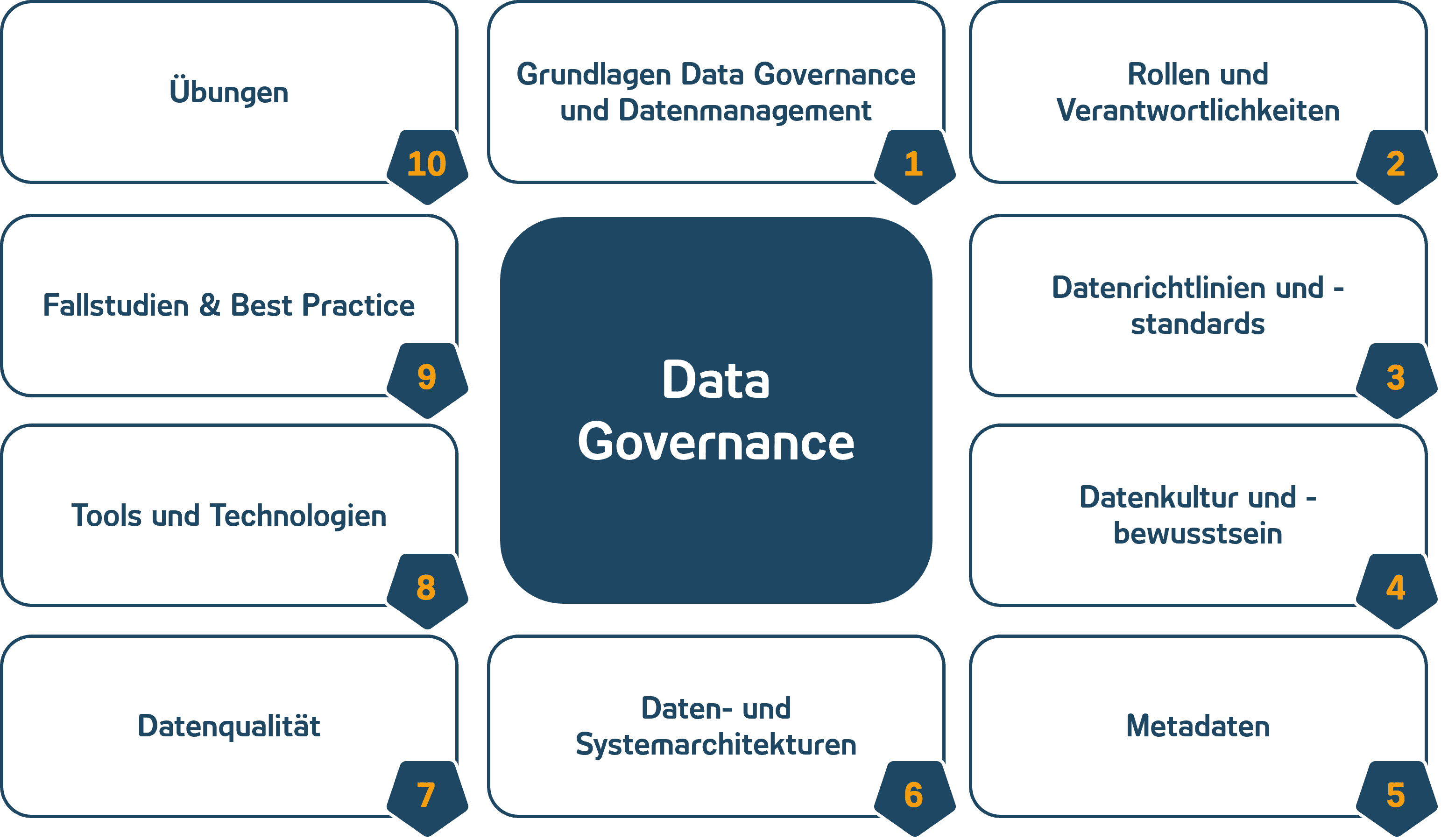These ten topics will guide you towards
sustainable data management
Training concept for your data governance
The amount of data available to the financial services industry is growing exponentially. At the same time, the requirements for rapid evaluation as well as handling and transparent understanding are increasing.
In addition to data analytics and requirements for generative artificial intelligence, e.g. for product and customer communication improvements, reporting requirements, e.g. the Corporate Sustainability Reporting Directive, must increasingly be met by the supervisory authority.
But data should not only be organized transparently and centrally in order to meet regulatory requirements. Rather, it is about management-relevant decisions on competitive advantages that enable companies to better understand their customers and needs in order to use them as a basis for artificial intelligence and innovation. Because one thing is certain:
The relevance of qualitatively well-structured company data as an asset will continue to increase!
According to a survey conducted by KPMG in 2023, 75 percent of the banks, insurance companies and financial services companies surveyed stated that the transformation to a data-driven company is very important to them. At the same time, however, they make it clear that there are still many obstacles to overcome on the way there. According to the company, there is a lack of effective data governance and data culture.
This makes it all the more urgent for financial service providers to seize this opportunity!
On the way to becoming a data-driven company, data governance ensures that data can be used effectively to create real added value. Clear guidelines, responsibilities and reliable data quality management ensure that the right data is used by the right people at the right time and in the right form.
This is the only way to achieve competitive advantages in the long term.
In this context, ADWEKO was able to further expand its position in the area of data governance last year through new partnerships such as the one with Synabi and consulting mandates. Initially, an internal Data Governance Academy was set up internally to provide our consultants with broader and deeper training on the specialized requirements of our clients in the financial services sector. The Academy aims to impart knowledge and skills in order to further develop employees’ understanding and competencies with regard to the cornerstones of a data governance organization and software support.
The ten steps for sustainable data management
1. Fundamentals of data governance: introduction to the basics and concepts of data governance, including definitions, objectives, benefits, principles and best practices.
2. Roles and responsibilities: Presentation of the different roles within data governance, such as data stewards, data owners, data custodians, and their specific responsibilities.
3. Data guidelines and standards as well as regulatory requirements: Explanations of data policies, data protection, security, compliance, legal requirements and their implementation in practice.
4. Data culture and awareness: Promote a data-driven culture within the organization, training to raise awareness of the value of data and its proper handling.
5. Metadata management: importance of metadata, metadata standards, management and use for effective data management, subject object model, data catalog
6. Data and system architecture: from the data model to the enterprise data model and classification in the system, business and IT architecture
7. Data quality management: dimensions of data quality, DQ rules, measurements and reporting or data management processes.
8. Tools and technologies: introduction to data management and governance tools to help implement data governance processes, business intelligence best practices to monitor DQ results.
9. Case studies and best practices: Presentation of case studies, success stories and best practices from the field to show how data governance has been successfully implemented and what challenges have been overcome.
10. Practical exercises: Case study analyses, discussions, and practical exercises to apply and deepen the knowledge learned, e.g. on role assignments and competencies within the framework of guidelines.
Figure 1: Contents of the Data Governance Academy
Become the architect of your data-driven future!
After the first litmus test of the first Data Governance Academy, this could also be booked for you as a customer in the coming year. Take part in our Data Governance Academy with your team and feel free to contact us with questions and offers for specific project support to gain a deeper understanding of how to manage and secure your valuable information.
Unleash the full potential of your data and learn proven methods, tools and strategies that will help you maximize data understanding and increase the efficiency of your business decisions.





